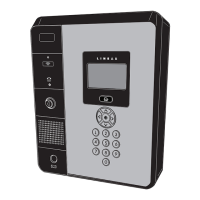1
Introduction
The EC / EN Telephone Entry & Access Control System is designed for use as a primary access control device for gated communities, parking
garages, ofce buildings, apartments, dormitories, hotels/motels, commercial buildings, and recreational facilities.
NOTE: Minor variations exist between models utilizing different housing material which does not affect functionality. This manual references
the EN-2M4, but covers common functionality throughout the series and notes differences where applicable.
Housed in a locked enclosure, EC / EN Series units feature a back-lit keypad with bright, easy-to-read graphics, a color LCD directory display with
programmable welcome message, a built-in microphone and speaker, and an ADA compliant TTY jack for use by the hearing impaired. The system
also has provisions to internally mount a card reader, and for mounting a U.S.P.S. supplied postal lock. The cabinet security is monitored with a
mechanical “tamper” switch. The unit houses four relays. Two can be programmed to control electric door strikes, magnetic locks, door & gate
operators or barrier gates. The other two can be programmed for auxiliary options, such as a propped door alarm.
The system utilizes hands-free, telephone communications between visitors and residents for granting access. Complete access control event
logging, access time restriction, access location restriction, and administration functions are also available to manage the installation.
The EC Series is network ready, but it can’t interconnect to other EC / EN or EXN modules. The EN Model can be interconnected (one database)
to a controlling LAN hub via an Ethernet cable. Each EN Series unit can be used in mixed networks with other compatible access control products,
including the EN-2M4 (4.3” screen and key pad), EN-2M7 (7” touch screen and key pad). Refer to the Feature Overview section, next page.
Future Option - Four Wiegand reader inputs 2 doors In/out are available for connection of up to 64-bit format Wiegand devices (card readers, etc.).
Each reader input supports connecting an “in” and an “out” reader.
Operation
In a typical installation, the unit’s memory can be programmed with each resident’s name and directory code number. Arriving visitors would use the
keypad on the unit to view the directory names and directory number for the desired resident. Upon selecting the directory number, the unit will dial
the resident’s telephone number and establish two-way voice communication between the visitor and the resident. The resident will then have the
option to grant or deny access to the visitor by pressing the phone’s 9 key.
In addition to the telephone entry, the unit can grant access using entry codes at the local or remote keypads. Also remote receivers, card readers,
and interior and exterior keypads can be used with the system.
MegaCode
®
transmitters can be used to gain access through the included radio receiver. Each transmitter can be individually suspended or
re-activated. The system’s clock/calendar can control access based on specic times and dates. Automatic relay activation can be scheduled. Access
can be restricted to certain times and dates. Holiday access can be scheduled. The system’s event log records system activity for future reference.
Programming and Cardholder Maintenance
System programing and maintenance can be performed locally or remotely via a network LAN and/or WAN connection to the system.

